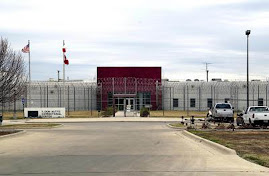The numerous reports highlighting the transfer of families from Hutto to Berks have brought attention to this rather under-publicized family residential facility, and I thought I'd provide some information about Berks. (The Reading Eagle reports, however, that the Berks Family Shelter Care Center is full. See previous post.)
Berks was opened in March of 2001, as an extension of Berks County's contract with then-INS' juvenile detention program. It is located on a large tract of land in Bernville Township that holds a number of county services: recycling, water treatment, an elderly care facility, a prison, a youth corrections center, a juvenile detention center, a community college, and an agricultural center.
The family detention center is located in an old nursing home, built in the 1950s. Still called Berks Heim by locals, the facility was a state of the art residence for elderly folks that required specialized care. Built as a residence, rather than a prison, Berks has been held up as an alternative to T Don Hutto. Licensed by the state of Pennsylvania and run according to child welfar principles, Berks has not been subject to the same media or legal attention as Hutto.
But as the Women's Refugee Commission's Michell Brané pointed out in Locking up Family Values, Berks is far from perfect. In response to ICE's policy change, Brané maintains: "While conditions there were not as shocking as those at Hutto, they are not appropriate. For example, children over five, are separated from their parents at night. We believe that families should not be detained unless absolutely necessary and only for an extremely short period of time.” (See the Women's Commissions full press release here.)
Both the ACLU and the Women's Commission (as well as others) have argued the authority structure of detention is harmful to families, since it strips parents of their role as arbiters of the family unit. While much of the attention has been focused on the conditions of detention, people often forget the effects any institutional environment will have on the less tangible--but fundamental--relationships between parents and children.
Mentioned even less often is how institutionalization effects relationships between parents, since their contact is highly constrained. Married couples cannot, for example, sleep together nor show affection towards each other. These kinds of relationships require some degree of privacy, which is difficult to balance with security and authority structures inherent to institutional custody.
There is no research on this, but as human beings, we can expect that compiling the stress of filing and pursuing claims with an inability to care for each other in familiar ways will have long terms effects on family relationships. This points to the larger question, which Brané has repeated asked, about the suitability detaining any families at all.
skip to main |
skip to sidebar



(photo ©Walt Harrison.)

(photo ©Walt Harrison)

(photo ©Walt Harrison)

(photo ©Walt Harrison)

Upcoming Events
Dignity Not Detention Vigil | T. Don Hutto Detention Center | Taylor, TX. | 7pm, Saturday, August 7th, 2010. See post.
What is T Don Hutto?
The T Don Hutto facility held men, women (some pregnant), children, and infants from May 2006 to September 2009. Administered by the Corrections Corporation of America (CCA), the country's largest for-profit corrections company, the center now holds around 500 adult women, many of whom are seeking asylum.
The Berks County Family Care Shelter still detains families. We continue to advocate for an end to family detention policy.
ICE champions the facility as a model for "civil" detention, despite patterns of sexual abuse and the continued detention of low-risk noncitizen women.
This blog is dedicated to providing information about Hutto and women's detention issues.
The Berks County Family Care Shelter still detains families. We continue to advocate for an end to family detention policy.
ICE champions the facility as a model for "civil" detention, despite patterns of sexual abuse and the continued detention of low-risk noncitizen women.
This blog is dedicated to providing information about Hutto and women's detention issues.
100 Events in 100 Days to End Family Detention
We did it! People like you came together and organized over 100 events to end family detention in Obama's first 100 days. Our online petition has over 55,000 signatures and counting! Our deepest gratitude!
Thanks to your support, ICE ended family detention at Hutto in September of 2009. The facility now holds exclusively women. We continue to advocate for their rights to due process, fair immigration proceedings, and non-penal custody.

Thanks to your support, ICE ended family detention at Hutto in September of 2009. The facility now holds exclusively women. We continue to advocate for their rights to due process, fair immigration proceedings, and non-penal custody.



Download the 2009 End Family Detention Calendar!
Check out our new photo gallery!
Followers
Further information
Locking Up Family Values, The most complete analysis of conditions inside T Don Hutto and Berks, a second family detention center in Pennsylvania. Published March, 2007
ICE's (Immigration & Customs Enforcement) newly-published standards on family residential standards.
Grassroots Leadership's report on CCA's history and business practices. Published Dec, 2003
Financial Analysis of the Impact of Undocumented Immigrants in Texas. Published by Carole Keeton Strayhorn, Texas Comptroller. Dec, 2006
The Sentencing Project's
Reducing Racial Disparity in the Criminal Justice System. Oct, 2000
Rates of Incarceration by Race & Ethnicity The Sentencing Project. July, 2007
Click here for a list of detention facilities across the U.S.
ICE's (Immigration & Customs Enforcement) newly-published standards on family residential standards.
Grassroots Leadership's report on CCA's history and business practices. Published Dec, 2003
Financial Analysis of the Impact of Undocumented Immigrants in Texas. Published by Carole Keeton Strayhorn, Texas Comptroller. Dec, 2006
The Sentencing Project's
Reducing Racial Disparity in the Criminal Justice System. Oct, 2000
Rates of Incarceration by Race & Ethnicity The Sentencing Project. July, 2007
Click here for a list of detention facilities across the U.S.
Related Blogs and Links
America's Family Prison
a short film chronicling the rise of Hutto and its impact on detainees and the local community
The Least of These
a feature-length documentary that follows the implementation of family detention at Hutto, the lawsuit, and protests against the facility. Premiered at Austin's South-by-Southwest Film Festival in March of 2009.
The Sanctuary
a short film chronicling the rise of Hutto and its impact on detainees and the local community
The Least of These
a feature-length documentary that follows the implementation of family detention at Hutto, the lawsuit, and protests against the facility. Premiered at Austin's South-by-Southwest Film Festival in March of 2009.
The Sanctuary
A grassroots effort of pro-migrant, human-rights, and civil-rights bloggers and on-line activists dedicated to the enactment of meaningful immigration reform that is practical, rational, fair, and humane.
Homeland Gitmos
Follow an investigation of detainee treatment in American detention centers. An interactive website, complete with videos, detainee testimonies, photos, maps, and more.
Business of Detention
an exciting new interactive website examining the link between federal immigration policy and the corporations that are profiting off it
Detention Watch Network
a national coalition dedicated to tracking immigrant detention issues
Free the Children Myspace
one of the first websites devoted to covering Hutto
Grits for Breakfast
one of the best sources available on the TX criminal justice system
Migration Policy Institute
a nonpartisan think tank dedicated to the study of the movement of people worldwide
National Immigration Forum
to embrace & uphold America's tradition as a nation of immigrants
Pew Hispanic Center
chronicling Latinos' diverse experiences in a changing America
Texas Civil Rights Review
reports from the front lines of the fight for civil rights in TX
Texas Prison Bid'ness
information about the growing prison-for-profit industry in Texas
Follow an investigation of detainee treatment in American detention centers. An interactive website, complete with videos, detainee testimonies, photos, maps, and more.
Business of Detention
an exciting new interactive website examining the link between federal immigration policy and the corporations that are profiting off it
Detention Watch Network
a national coalition dedicated to tracking immigrant detention issues
Free the Children Myspace
one of the first websites devoted to covering Hutto
Grits for Breakfast
one of the best sources available on the TX criminal justice system
Migration Policy Institute
a nonpartisan think tank dedicated to the study of the movement of people worldwide
National Immigration Forum
to embrace & uphold America's tradition as a nation of immigrants
Pew Hispanic Center
chronicling Latinos' diverse experiences in a changing America
Texas Civil Rights Review
reports from the front lines of the fight for civil rights in TX
Texas Prison Bid'ness
information about the growing prison-for-profit industry in Texas
Blog about all things immigration.
Immigration Prof Blog
Research and reflection by leading immigration scholars
States without Nations
Jacqueline Stevens, political scientist, blogs about immigration, nationalism, and the state.
Dream ACTivist
Campaign to pass the DREAM ACT, which grants access to higher education for immigrant youth.
Immigration Prof Blog
Research and reflection by leading immigration scholars
States without Nations
Jacqueline Stevens, political scientist, blogs about immigration, nationalism, and the state.
Dream ACTivist
Campaign to pass the DREAM ACT, which grants access to higher education for immigrant youth.
Click on link to learn more about:
Highlights from Dec 16th vigil

(photo ©Walt Harrison.)

(photo ©Walt Harrison)

(photo ©Walt Harrison)

(photo ©Walt Harrison)
Blog Archive
-
▼
2009
(67)
-
▼
August
(19)
- Free Least of These Screening, Austin, Tx
- Houston Solidarity with Aug. 22 Rally; Aug. 29 Ral...
- Berks County Considering End of Family Detention C...
- USA Today, Raul Reyes: A kindler gentler immigrati...
- The Economist: When Home Is Prison
- Williamson Co. Sun Recognizes Impact of Local Orga...
- Austin-American Statesman: Grassroots Movement Hel...
- ACLU: Hutto Settlement Extended
- Michelle Brané: Good News on Immigration Detention...
- CCA's response...
- Berks County Family Center full
- What about Berks?
- What will happen to the families at Hutto?
- More News Coverage
- Austin-America Statesman: Hutto to cease detaining...
- BREAKING NEWS: ICE ENDS FAMILY DETENTION AT T DON ...
- Texas Organizations Support Protext Citizens from ...
- Austin-American Statesman: Critics push for immigr...
- Susan Wakusch: County Must Cut Ties to T. Don Hutto
-
▼
August
(19)

Contact Info
For questions on T Don Hutto or the blog, please contact:
tuff [at] grassrootsleadership.org
tuff [at] grassrootsleadership.org
Supporting Institutions
ACLU of Texas, Amnesty International, Brown Berets of San Antonio, Grassroots Leadership, PODER, LIRS, Free the Children, Political Asylum Project of Austin, Catholic Charities of Austin, Casa Marianella, Casa Esperanza, Jolu Productions, Sin Fronteras of Houston, Southern Human Rights Organizers' Network, Texas Indigenous Council, Texans United for Families, University of TX Immigration Clinic, Women's Commission for Refugee Women and Children.
Thanks to all.
Thanks to all.
